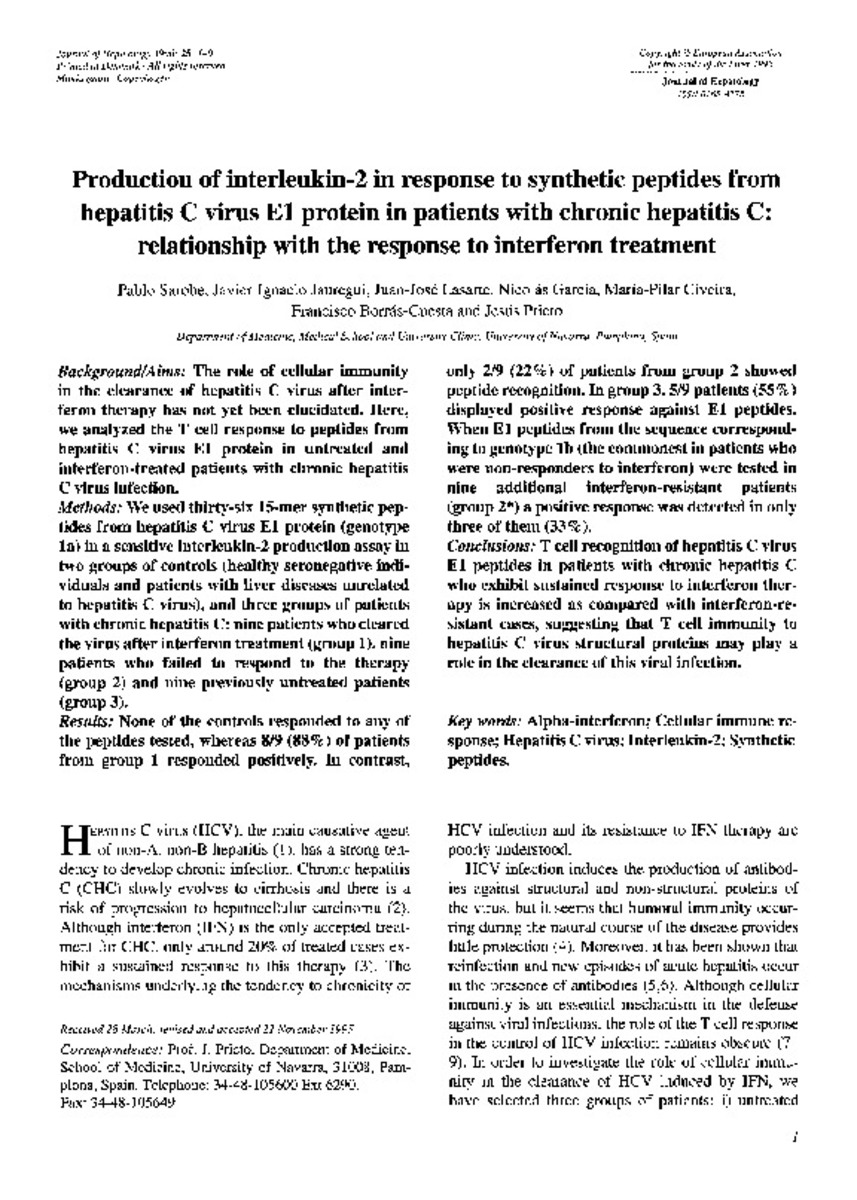Full metadata record
| DC Field | Value | Language |
|---|---|---|
| dc.creator | Sarobe, P. (Pablo) | - |
| dc.creator | Jauregui, J.I. (Javier Ignacio) | - |
| dc.creator | Lasarte, J.J. (Juan José) | - |
| dc.creator | Garcia, N. (Nicolás) | - |
| dc.creator | Civeira, M.P. (María Pilar) | - |
| dc.creator | Borras-Cuesta, F. (Francisco) | - |
| dc.creator | Prieto, J. (Jesús) | - |
| dc.date.accessioned | 2012-04-17T14:40:48Z | - |
| dc.date.available | 2012-04-17T14:40:48Z | - |
| dc.date.issued | 1996 | - |
| dc.identifier.citation | Sarobe P, Jauregui JI, Lasarte JJ, Garcia N, Civeira MP, Borras-Cuesta F, et al. Production of interleukin-2 in response to synthetic peptides from hepatitis C virus E1 protein in patients with chronic hepatitis C: relationship with the response to interferon treatment. J Hepatol 1996 Jul;25(1):1-9. | es_ES |
| dc.identifier.issn | 1600-0641 | - |
| dc.identifier.uri | https://hdl.handle.net/10171/21675 | - |
| dc.description.abstract | BACKGROUND/AIMS: The role of cellular immunity in the clearance of hepatitis C virus after interferon therapy has not yet been elucidated. Here, we analyzed the T cell response to peptides from hepatitis C virus E1 protein in untreated and interferon-treated patients with chronic hepatitis C virus infection. METHODS: We used thirty-six 15-mer synthetic peptides from hepatitis C virus E1 protein (genotype 1a) in a sensitive interleukin-2 production assay in two groups of controls (healthy seronegative individuals and patients with liver diseases unrelated to hepatitis C virus), and three groups of patients with chronic hepatitis C: nine patients who cleared the virus after interferon treatment (group 1), nine patients who failed to respond to the therapy (group 2) and nine previously untreated patients (group 3). RESULTS: None of the controls responded to any of the peptides tested, whereas 8/9 (88%) of patients from group 1 responded positively. In contrast, only 2/9 (22%) of patients from group 2 showed peptide recognition. In group 3, 5/9 patients (55%) displayed positive response against E1 peptides. When E1 peptides from the sequence corresponding to genotype 1b (the commonest in patients who were non-responders to interferon) were tested in nine additional interferon-resistant patients (group 2*) a positive response was detected in only three of them (33%). CONCLUSIONS: T cell recognition of hepatitis C virus E1 peptides in patients with chronic hepatitis C who exhibit sustained response to interferon therapy is increased as compared with interferon-resistant cases, suggesting that T cell immunity to hepatitis C virus structural proteins may play a role in the clearance of this viral infection. | es_ES |
| dc.language.iso | eng | es_ES |
| dc.publisher | Elsevier | es_ES |
| dc.rights | info:eu-repo/semantics/openAccess | es_ES |
| dc.subject | Alpha-interferon | es_ES |
| dc.subject | Cellular immune response | es_ES |
| dc.subject | Hepatitis C virus | es_ES |
| dc.subject | Interleukin-2 | es_ES |
| dc.subject | Synthetic peptides | es_ES |
| dc.title | Production of interleukin-2 in response to synthetic peptides from hepatitis C virus E1 protein in patients with chronic hepatitis C: relationship with the response to interferon treatment | es_ES |
| dc.type | info:eu-repo/semantics/article | es_ES |
| dc.relation.publisherversion | http://www.sciencedirect.com/science/article/pii/S0168827896803205 | es_ES |
| dc.type.driver | info:eu-repo/semantics/article | es_ES |
Files in This Item:
Statistics and impact
Items in Dadun are protected by copyright, with all rights reserved, unless otherwise indicated.






